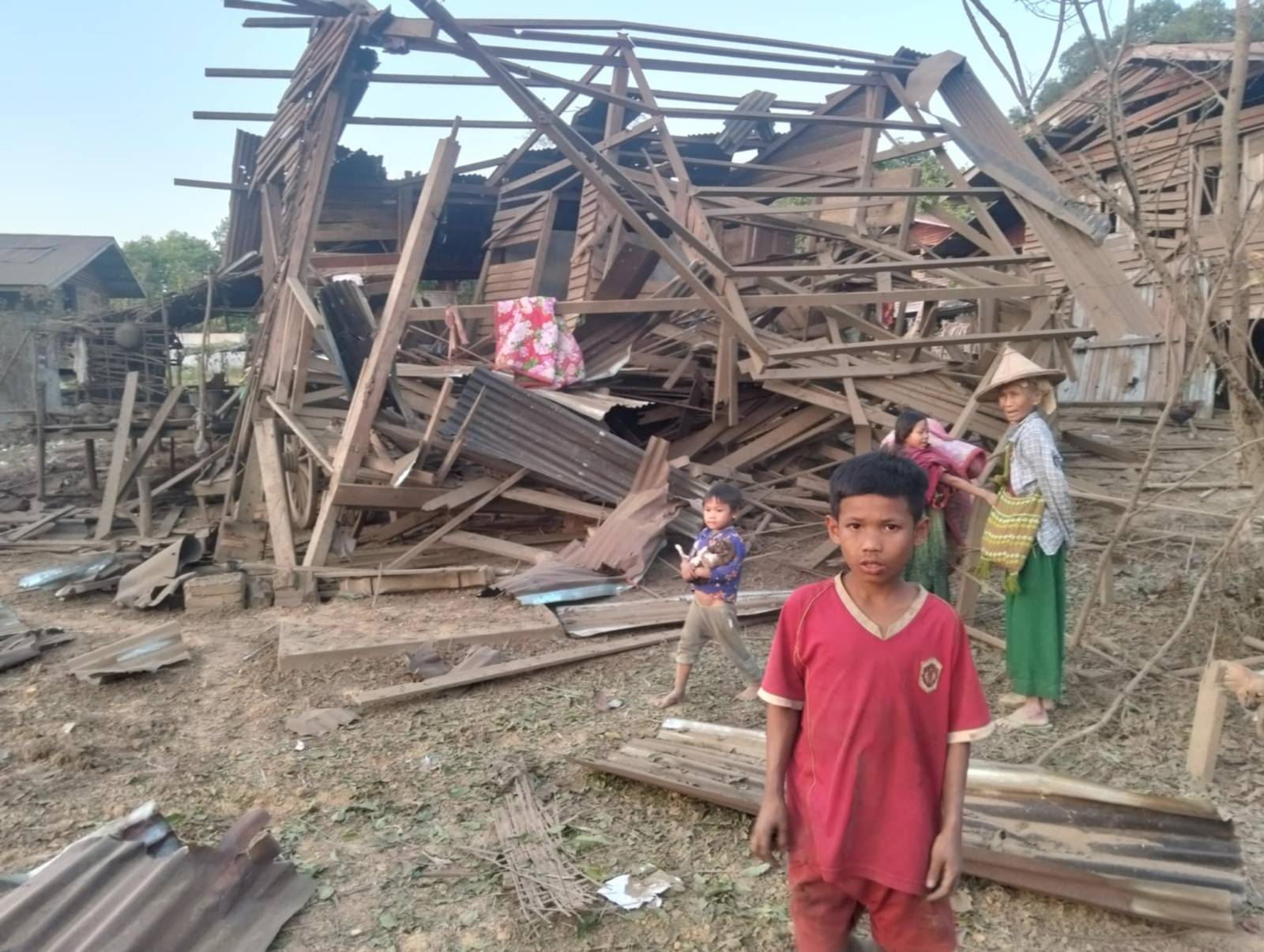|
|
 |
February 20, 2025 |
|
|
|
 |
A boy from Htee Pa Doh Hta Village stands in front of destruction caused by a Burma military airstrike. |
Burma Military Air Attacks Cause Civilian Deaths |
|
|
Burma military airstrikes and drone attacks continue to cause damage to civilian populations and infrastructure. In northern Karen State, a drone attack on Ka Nyi Jo Village resulted in two casualties and some destroyed homes. In central Karen State, airstrikes in Pyin Ka Toe Kone, Kawkap, and Htee Pa Doh vIllages left dead, wounded, and at least 17 homes and a church destroyed. |
|
|
|
|
|
Left: A burning house and motorbike destroyed by Burma military drones in Ka Nyi Jo Village. Right: Three Burma Army soldiers who surrendered to the KNLA. |
Top: A burning house and motorbike destroyed by Burma military drones in Ka Nyi Jo Village. Bottom: Three Burma Army soldiers who surrendered to the KNLA. |
|
|
On Feb. 9, the Burma military arrested two villagers who were retrieving their bikes in Toe Ta Dah and demanded 20 million kyats for their release. On Feb.11, Burma military attacked Ka Nyi Jo Village with drones, killing one People’s Defence Force (PDF) soldier, injuring one villager, burning down a house and destroying a motorbike. On Feb. 17, three Burma Army deserters, illegally arrested under the conscription law, surrendered themselves and their rifles to Karen National Liberation Army (KNLA). The prisoners mentioned that although many Burma Army conscripts like them wanted to escape, many decided against it because escaping along the route to the KNLA was very dangerous. |
|
|
|
|
|
|
|
Left: A Burma military airstrike leaves behind a crater and destroyed village at Htee Pa Doh Hta. Right: School grounds in Kawkap Village devastated by a Burma military airstrike. |
Top: A Burma military airstrike leaves behind a crater and destroyed village at Htee Pa Doh Hta. Bottom: School grounds in Kawkap Village devastated by a Burma military airstrike. |
|
|
The Burma military launched a series of airstrikes in Doo Tha Htoo District, killing and wounding PDF soldiers and also destroying or damaging over 20 buildings.
In Doo Tha Htoo District, Kyaikto Township, a Burma military jet bombed a PDF position on Feb. 13, in Pyin Ka Toe Kone Village, resulting in multiple deaths and casualties. KNLA and Ranger medics responded and provided medical treatment to the injured. The same day, a Burma military jet launched an airstrike at a school in Kawkap Village (Kyaikto Township), damaging buildings but harming no civilians.
In Bilin Township, at Htee Pa Doh Hta Village, a Burma military fighter jet bombed the village on Feb. 13, destroying 17 houses and a church. |
|
|
|
|
|
Doctors and nurses perform operations on critical patients injured from the conflict. Locations of operating centers such as Luke Hospital are kept confidential to help reduce risk of Burma military airstrikes that frequently target civilian support infrastructure. |
|
|
Luke Hospital in Karenni state is one of those special places that has not given up and continues caring for people affected by this conflict.
FBR introduced Luke hospital to Sky News which led to the filming of a documentary about it called “The Last Hospital.” It recently won the 2024 International Emmy Award for Current Affairs. FBR continues to have a deep connection with Luke Hospital. Just this last year, Luke hospital performed over 900 surgeries, treated over 1700 patients in the inpatient wards as well as seeing almost 2000 patients in their outpatient department.
Large gaps in medical care persist in Karenni State. There are likely no cardiothoracic, pediatric, neuro, spine surgeons or internists in the entire state. There are also no psychologists or psychiatrists.
This year, the hospital hopes to turn their neonatal ward into a real neonatal intensive care unit. However, they still lack incubators, proper monitoring equipment and many emergency pediatric medications that remain unavailable in Burma. They are also hoping to one day have a defibrillator, a ventilator, a BiPap machine, a C-Arm X-ray machine, and an ABG analyzer. They currently have no Kiwi extractors or defibrillators.
FBR has supported Luke Hospital over the years by providing funds for the hospital wards, the maternity ward, X-ray machines, generator, water supply, staff support, and medicine, as well as helping the construction of a satellite hospital. During this last January and February mission, FBR also donated a large amount of surgical supplies, a video laryngoscope for the anesthesia team (which they did not have any of), surgical instruments, and orthopedic supplies.
This year our medical team also provided surgical training as well as anesthesia training to their physicians.
We are honored to partner with Luke Hospital and will continue to do so as long as we are able. Please continue to pray for Karenni State and Luke Hospital, that more people would find healing and care and that the healthcare professionals would be encouraged to continue forward despite so many challenges. |
|
|
|
|
|
|
|
Administrative offices destroyed by a Burma military airstrike near Webula Zanniat. |
|
|
A Burma military jet dropped two bombs near Webula Zanniat at 1025 hours on Feb. 14, destroying an old police station and administrative office. Local sources believe the Burma military suspected these buildings were being used by the resistance. |
|
|
|
|
|
Left: Mahamed, one of our team members, is hard at work repairing and maintaining our armored ambulances. His efforts ensure that we can effectively steward our resources and continue our mission to save lives. Right: Ibrahim, one of our team members, participates in our recent medical training sessions, enhancing his skills to better serve those in need. |
Top: Mahamed, one of our team members, is hard at work repairing and maintaining our armored ambulances. His efforts ensure that we can effectively steward our resources and continue our mission to save lives. Bottom: Ibrahim, one of our team members, participates in our recent medical training sessions, enhancing his skills to better serve those in need. |
|
|
This past week, our Iraq team provided financial assistance to three families, helping cover medical expenses and essential documents. Meanwhile, they continued to sharpen their skills through TCCC training, reinforcing their medical readiness. A crucial but often unseen part of our relief missions is maintaining gear and vehicles, ensuring our armored ambulances can navigate rough terrain safely. These combined efforts, both in direct aid and preparedness, are essential to sustaining our mission and serving those in need. |
|
|
|
|
|
Left: Our FBR Syrian coordinator, Khabat, spending time with displaced children at an IDP camp in Hasakah. Right: One of our American FBR volunteers donating blood for the Syrian people—several of our team members took part in this effort! |
Top: Our FBR Syrian coordinator, Khabat, spending time with displaced children at an IDP camp in Hasakah. Bottom: One of our American FBR volunteers donating blood for the Syrian people—several of our team members took part in this effort! |
|
|
From Feb. 7 to Feb. 10, our Syria team was on the ground in Hasakah, bringing medical care and support to displaced families. On Feb. 7, we set up a clinic at an IDP location, where we treated 57 patients and held a GLC session for the community. The next day, at another IDP camp, we provided care for 62 people and another GLC session.
On Feb. 10, we visited two more locations, both schools sheltering displaced families. At the next IDP settlement, we treated 24 patients and held a GLC session for 20 children. Lastly, at the final IDP location, 33 patients received care, and 35 children participated in GLC activities. Beyond medical and educational support, our team also took a personal step to help—donating blood to those in need. It was a small but meaningful way to stand in solidarity with the people of Syria. |
|
|
|
|
|
|
